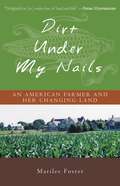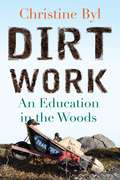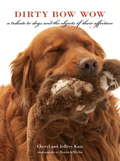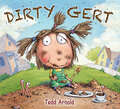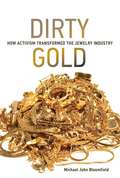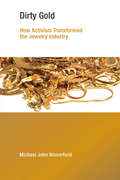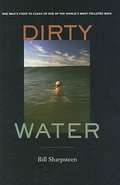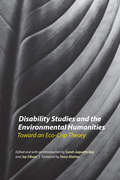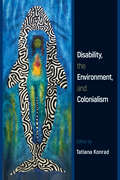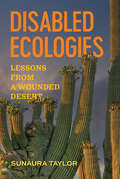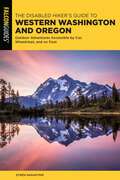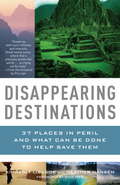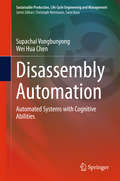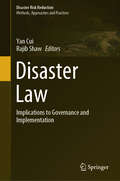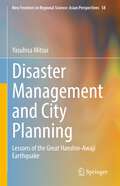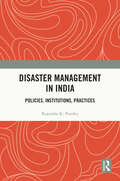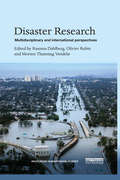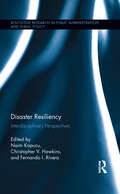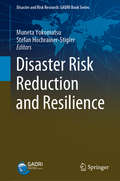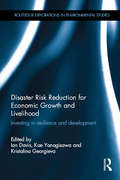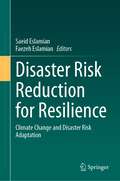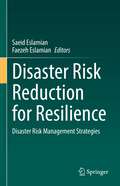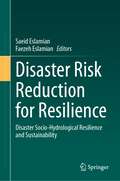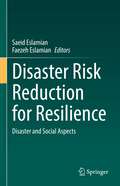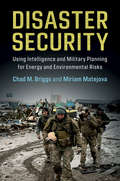- Table View
- List View
Dirt Under My Nails: An American Farmer and Her Changing Land
by Marilee FosterA woman farmer observes with a poetic and appreciative eye the transformation of the plant and animal life on her land through the changing seasons, and now through the encroachment of residential development.
Dirt Work: An Education in the Woods
by Christine BylA lively and lyrical account of one woman's unlikely apprenticeship on a national-park trail crew and what she discovers about nature, gender, and the value of hard work Christine Byl first encountered the national parks the way most of us do: on vacation. But after she graduated from college, broke and ready for a new challenge, she joined a Glacier National Park trail crew as a seasonal "traildog" maintaining mountain trails for the millions of visitors Glacier draws every year. Byl first thought of the job as a paycheck, a summer diversion, a welcome break from "the real world" before going on to graduate school. She came to find out that work in the woods on a trail crew was more demanding, more rewarding--more real--than she ever imagined. During her first season, Byl embraces the backbreaking difficulty of the work, learning how to clear trees, move boulders, and build stairs in the backcountry. Her first mentors are the colorful characters with whom she works--the packers, sawyers, and traildogs from all walks of life--along with the tools in her hands: axe, shovel, chainsaw, rock bar. As she invests herself deeply in new work, the mountains, rivers, animals, and weather become teachers as well. While Byl expected that her tenure at the parks would be temporary, she ends up turning this summer gig into a decades-long job, moving from Montana to Alaska, breaking expectations--including her own--that she would follow a "professional" career path. Returning season after season, she eventually leads her own crews, mentoring other trail dogs along the way. In Dirt Work, Byl probes common assumptions about the division between mental and physical labor, "women's work" and "men's work," white collars and blue collars. The supposedly simple work of digging holes, dropping trees, and blasting snowdrifts in fact offers her an education of the hands and the head, as well as membership in an utterly unique subculture. Dirt Work is a contemplative but unsentimental look at the pleasures of labor, the challenges of apprenticeship, and the way a place becomes a home.
Dirty Bow Wow
by Jeffrey KatzA winsome collection of 50 full-color, all-breed canine portraits, each posed with a favorite play toy and accompanied by an affectionate anecdote. Dirty Wow Wow was ranked #3 on Entertainment Weekly's "Ten Things We Love" List The creators of the popular book DIRTY WOW WOW present this brand new album, featuring beloved family pets and the raggedy objects of their affection. Big dogs, small dogs, mixed breeds, purebreds, puppies, and seniors tug, chase, chew, guard, nuzzle, sleep on, and play with their shredded teddies, blankies, and chewies. Each dog portrayed has formed a bond with a self-selected favorite, and many of them remain loyal to just one toy. Among the toys that have survived the perils of puppyhood, many continue to give comfort and joy to their aging pooches. Every lovingly photographed image of our best friends with their best friends will resonate with dog lovers and the readers who love them. Reviews"Loving, whimsical tribute to dogs and their favorite chew toys. "-New York Daily News
Dirty Gert
by Tedd ArnoldGert loves dirt. She rolls in it, digs in it, even tastes it. But one day, while she's making mud pies, all that dirt changes her. Gert sprouts leaves, grows roots, and begins to photosynthesize in the sunlight! Gert is delighted, but the neighborhood can&’t believe it. . . and soon the notoriety becomes too much for the grungy, green girl. Luckily, Mom and Dad know just what to do! Told in rhythm and rhyme and full of fun, tongue-twisting vocabulary, Dirty Gert is a celebration of individuality and unconditional love. . . and, of course, of the fun of playing in the dirt. Tedd Arnold&’s cartoonish illustrations—complete with a cast of whispering worm commentators—express the joy of making mudpies, playing with worms, and most importantly, spending time with your loving family.
Dirty Gold: How Activism Transformed the Jewelry Industry
by Michael John BloomfieldGold mining can be a dirty business. It creates immense amounts of toxic materials that are difficult to dispose of. Mines are often developed without community consent, and working conditions for miners can be poor. Income from gold has funded wars. And consumers buy wedding rings and gold chains not knowing about any of this. In Dirty Gold, Michael Bloomfield shows what happened when Earthworks, a small Washington-based NGO, launched a campaign for ethically sourced gold in the consumer jewelry market, targeting Tiffany and other major firms. The unfolding of the campaign and its effect on the jewelry industry offer a lesson in the growing influence of business in global environmental politics. Earthworks planned a "shame" campaign, aimed at the companies' brands and reputations, betting that firms like Tiffany would not want to be associated with pollution, violence, and exploitation. As it happened, Tiffany contacted Earthworks before they could launch the campaign; the company was already looking for partners in finding ethically sourced gold.Bloomfield examines the responses of three companies to "No Dirty Gold" activism: Tiffany, Wal-Mart, and Brilliant Earth, a small company selling ethical jewelry. He finds they offer a case study in how firms respond to activist pressure and what happens when businesses participate in such private governance schemes as the "Golden Rules" and the "Conflict-Free Gold Standard." Taking a firm-level view, Bloomfield examines the different opportunities for and constraints on corporate political mobilization within the industry.
Dirty Gold: How Activism Transformed the Jewelry Industry (Earth System Governance)
by Michael John BloomfieldThe response from the jewelry industry to a campaign for ethically sourced gold as a case study in the power of business in global environmental politics.Gold mining can be a dirty business. It creates immense amounts of toxic materials that are difficult to dispose of. Mines are often developed without community consent, and working conditions for miners can be poor. Income from gold has funded wars. And consumers buy wedding rings and gold chains not knowing about any of this. In Dirty Gold, Michael Bloomfield shows what happened when Earthworks, a small Washington-based NGO, launched a campaign for ethically sourced gold in the consumer jewelry market, targeting Tiffany and other major firms. The unfolding of the campaign and its effect on the jewelry industry offer a lesson in the growing influence of business in global environmental politics. Earthworks planned a “shame” campaign, aimed at the companies' brands and reputations, betting that firms like Tiffany would not want to be associated with pollution, violence, and exploitation. As it happened, Tiffany contacted Earthworks before they could launch the campaign; the company was already looking for partners in finding ethically sourced gold.Bloomfield examines the responses of three companies to “No Dirty Gold” activism: Tiffany, Wal-Mart, and Brilliant Earth, a small company selling ethical jewelry. He finds they offer a case study in how firms respond to activist pressure and what happens when businesses participate in such private governance schemes as the “Golden Rules” and the “Conflict-Free Gold Standard.” Taking a firm-level view, Bloomfield examines the different opportunities for and constraints on corporate political mobilization within the industry.
Dirty Water: One Man’s Fight to Clean Up One of the World’s Most Polluted Bays
by Bill SharpsteenDirty Water is the riveting story of how Howard Bennett, a Los Angeles schoolteacher with a gift for outrageous rhetoric, fought pollution in Santa Monica Bay--and won.
Disability Studies and the Environmental Humanities: Toward an Eco-Crip Theory
by Stacy Alaimo Sarah Jaquette Ray Jay SibaraAlthough scholars in the environmental humanities have been exploring the dichotomy between “wild” and “built” environments for several years, few have focused on the field of disability studies, a discipline that enlists the contingency between environments and bodies as a foundation of its scholarship. On the other hand, scholars in disability studies have demonstrated the ways in which the built environment privileges some bodies and minds over others, yet they have rarely examined the ways in which toxic environments engender chronic illness and disability or how environmental illnesses disrupt dominant paradigms for scrutinizing “disability.” Designed as a reader for undergraduate and graduate courses, Disability Studies and the Environmental Humanities employs interdisciplinary perspectives to examine such issues as slow violence, imperialism, race, toxicity, eco-sickness, the body in environmental justice, ableism, and other topics. With a historical scope spanning the seventeenth century to the present, this collection not only presents the foundational documents informing this intersection of fields but also showcases the most current work, making it an indispensable reference.
Disability, the Environment, and Colonialism
by Tatiana KonradDrawing on contemporary and historic literary and media examples of Western colonialism and Anglophone writings, Disability, the Environment, and Colonialism traces how the perverse nature of colonialism continues to dominate the globe today. The editor and contributors provide a careful analysis of the intersection of disability, the environment, and colonialism to understand issues such as eco-ableism, environmental degradation, homogenized approaches to environmentalism, and climate change. They also look at the body as a site of colonial oppression and environmental exploitation. Contributors: Holly Caldwell, Matthew J. C. Cella, John Gulledge, Memona Hossain, Nancy J. Hirschmann, Iain Hutchison, Andrew B. Jenks, Suha Kudsieh, Gordon M. Sayre, Jessica A. Schwartz, Anna Stenning, Aubrey Tang, Alice Wexler, and the editor.
Disabled Ecologies: Lessons from a Wounded Desert
by Sunaura Taylor"With breath-catching insight and enveloping compassion, Sunaura Taylor shares a secret of epochal urgency: people living with injury and impairment have much to teach about how to survive, and perhaps even thrive, on an injured and impaired planet."—Naomi Klein, author of Doppelganger A powerful analysis and call to action that reveals disability as one of the defining features of environmental devastation and resistance. Deep below the ground in Tucson, Arizona, lies an aquifer forever altered by the detritus of a postwar Superfund site. Disabled Ecologies tells the story of this contamination and its ripple effects through the largely Mexican American community living above. Drawing on her own complex relationship to this long-ago injured landscape, Sunaura Taylor takes us with her to follow the site's disabled ecology—the networks of disability, both human and wild, that are created when ecosystems are corrupted and profoundly altered. What Taylor finds is a story of entanglements that reach far beyond the Sonoran Desert. These stories tell of debilitating and sometimes life-ending injuries, but they also map out alternative modes of connection, solidarity, and resistance—an environmentalism of the injured. An original and deeply personal reflection on what disability means in an era of increasing multispecies disablement, Disabled Ecologies is a powerful call to reflect on the kinds of care, treatment, and assistance this age of disability requires.
Disabled Hiker's Guide to Western Washington and Oregon: Outdoor Adventures Accessible by Car, Wheelchair, and on Foot
by Syren NagakyrieThe Disabled Hiker&’s Guide to Western Washington and Oregon is the first book of its kind to consider the diverse needs of disabled people in the outdoors. This groundbreaking guidebook includes 60 outdoor adventures, including drive-up experiences, verified wheelchair accessible trails, and foot trails suitable for disabled hikers. This guide removes one of the barriers to access - a lack of information - by utilizing a rating system and detailed trail information designed for the disability community. Each trail is personally assessed according to Syren&’s skilled and detailed review and established accessibility guidelines.
Disappearing Destinations
by Kimberly Lisagor Heather HansenA beautiful and memorable look at some of the most gorgeous endangered places on the planet. Machu Picchu is a mesmerizing, ancient Incan city tucked away in the mountains of Peru, but it is rapidly being worn down by the thousands of feet treading across its stones. Glacier National Park is a destination long known for the stunning beauty of its ice floes, but in our lifetimes it will have no glaciers due to global warming. In the biobays of Puerto Rico swimmers can float in a sea shimmering with bioluminescent life, but sediment being churned up by development is killing the dinoflagellates that produce the eerie and beautiful glow. And in the Congo Basin of Africa, where great apes roam freely in lush, verdant rainforests, logging is quickly destroying the vast life-giving canopies. These places-along with many others across the globe-are changing as we speak due to global warming, environmental degradation, overuse, and natural causes. From the Boreal Forests in Finland to the Yangtze River Valley in China,37 Places to See Before They Disappearis a treasure trove of geographic wonder, and a guide to these threatened destinations and what is being done to save them.
Disassembly Automation
by Supachai Vongbunyong Wei Hua ChenThis book presents a number of aspects to be considered in the development of disassembly automation, including the mechanical system, vision system and intelligent planner. The implementation of cognitive robotics increases the flexibility and degree of autonomy of the disassembly system. Disassembly, as a step in the treatment of end-of-life products, can allow the recovery of embodied value left within disposed products, as well as the appropriate separation of potentially-hazardous components. In the end-of-life treatment industry, disassembly has largely been limited to manual labor, which is expensive in developed countries. Automation is one possible solution for economic feasibility. The target audience primarily comprises researchers and experts in the field, but the book may also be beneficial for graduate students.
Disaster Law: Implications to Governance and Implementation (Disaster Risk Reduction)
by Yan Cui Rajib ShawThis book covers the broad aspects of disaster legislation, governance, and their implementation. The book also includes in-depth reviews and new data, based on case studies across the globe, involving multidisciplinary research. In addition, the book suggests specific policies and action measures to enhance the implementation of disaster legislation for the resilience of people and local governments. Disaster law is the core to disaster risk management. The legal framework not only provides the government an instrument to take actions before, during, and after a disaster, but it also helps in recovery process. The legislative measures provide certain levels of guidance to different stakeholders such as national governments, local governments, civil societies, and more importantly citizens. The legal provision gives people and communities certain obligations as well as responsibilities to act during or before disasters. Over the last several years, there has been new disaster laws formulated in many countries, and revisions have been made to adjust the existing disaster laws to be more effective. Although it is important to have governance provision of disaster law, its implementation is essential.
Disaster Management and City Planning: Lessons of the Great Hanshin-Awaji Earthquake (New Frontiers in Regional Science: Asian Perspectives #58)
by Yasuhisa MitsuiThis book first provides a comprehensive guideline for future disaster-resistant city planning in large cities in disaster-prone countries such as Japan. It is a compilation of knowledge and know-how obtained through the author’s work in the national government for one and half years in the Earthquake Reconstruction Headquarters, right after the Great Hanshin-Awaji Earthquake on 17 January 1995. The author has carefully examined the various ad hoc measures taken just after the earthquake, which were criticized because they did not work as well as expected. Additionally, he has examined the later revisions in disaster and risk management systems made at the levels of local and national governments through experience in the Hanshin-Awaji Earthquake, to which the author had long been committed. The author argues that the rescue activities, rehabilitation, and reconstruction plans for disaster countermeasures implemented once a disaster has occurred and the city planning established in ordinary times should be extremely tightly connected with each other. City planning that subsumes rescue activities, rehabilitation, and reconstruction plans against what ought to have happened would critically improve the capability of crisis management and, consequently, protect life and property once a disaster has occurred. Such city planning eventually creates disaster-resistant cities. This book assumes readers to be graduate students who study city planning. It is also beneficial for practitioners and policy makers who are in charge of the construction of disaster-resistant cities at the national and local levels of governments, especially in disaster-prone countries.
Disaster Management in India: Policies, Institutions, Practices
by Rajendra K. PandeyThis book explores policies, structures, and processes of disaster management in India examining key theoretical foundations of disaster management with practical illustrations and case studies. The book offers a comprehensive understanding of disaster management policies and practices in India and focuses on public policy approaches in addressing critical issues and challenges facing the machinery and processes of disaster management in India. The creative approach to deal with different aspects of disaster management has helped in holistic delineation of a number of critical themes such as legal frameworks of disaster management, good practices, use of innovative approaches and technology, multilateral cooperation, the role of civil society organisations, among others. This book will be of interest to the students and researchers working in the field of disaster studies, geography, geology, development studies, public administration, public policy, economics, and governance. It will also be an invaluable companion for policy makers, practitioners, academicians and development planners working in the area of disaster management.
Disaster Research: Multidisciplinary and International Perspectives (Routledge Humanitarian Studies)
by Olivier Rubin Rasmus Dahlberg Morten Thanning VendeløGiven the tendency of books on disasters to predominantly focus on strong geophysical or descriptive perspectives and in-depth accounts of particular catastrophes, Disaster Research provides a much-needed multidisciplinary perspective of the area. This book is is structured thematically around key approaches to disaster research from a range of different, but often complementary academic disciplines. Each chapter presents distinct approaches to disaster research that is anchored in a particular discipline; ranging from the law of disasters and disaster historiography to disaster politics and anthropology of disaster. The methodological and theoretical contributions underlining a specific approach to disasters are discussed and illustrative empirical cases are examined that support and further inform the proposed approach to disaster research. The book thus provides unique insights into fourteen state-of-the-art disciplinary approaches to the understanding of disasters. The theoretical discussions as well as the diverse range of disaster cases should be of interest to both postgraduate and undergraduate students, as well as academics, researchers and policymakers.
Disaster Resiliency: Interdisciplinary Perspectives (Routledge Research in Public Administration and Public Policy)
by Naim Kapucu V. Hawkins Christopher I. Rivera FernandoNatural disasters in recent years have brought the study of disaster resiliency to the forefront. The importance of community preparedness and sustainability has been underscored by such calamities as Hurricane Katrina in 2005 and the Japanese tsunami in 2011. Natural disasters will inevitably continue to occur, but by understanding the concept of resiliency as well as the factors that lead to it, communities can minimize their vulnerabilities and increase their resilience. In this volume, editors Naim Kapucu, Christopher V. Hawkins, and Fernando I. Rivera gather an impressive array of scholars to provide a much needed re-think to the topic disaster resiliency. Previous research on the subject has mainly focused on case studies, but this book offers a more systematic and empirical assessment of resiliency, while at the same time delving into new areas of exploration, including vulnerabilities of mobile home parks, the importance of asset mapping, and the differences between rural and urban locations. Employing a variety of statistical techniques and applying these to disasters in the United States and worldwide, this book examines resiliency through comparative methods which examine public management and policy, community planning and development, and, on the individual level, the ways in which culture, socio-economic status, and social networks contribute to resiliency. The analyses drawn will lead to the development of strategies for community preparation, response, and recovery to natural disasters. Combining the concept of resiliency, the factors that most account for the resiliency of communities, and the various policies and government operations that can be developed to increase the sustainability of communities in face of disasters, the editors and contributors have assembled an essential resource to scholars in emergency planning, management, and policy, as well as upper-level students studying disaster management and policy.
Disaster Risk Reduction and Resilience (Disaster and Risk Research: GADRI Book Series)
by Stefan Hochrainer-Stigler Muneta YokomatsuThis book provides insight on how disaster risk management can increase the resilience of society to various natural hazards. The multi-dimensionality of resilience and the various different perspectives in regards to disaster risk reduction are taken explicitly into account by providing studies and approaches on different scales and ranging from natural science based methods to social science frameworks. For all chapters, special emphasis is placed on implementation aspects and specifically in regards to the targets and priorities for action laid out in the Sendai Framework for Disaster Risk Reduction. The chapters provide also a starting point for interested readers on specific issues of resilience and therefore include extensive reference material and important future directions for research.
Disaster Risk Reduction for Economic Growth and Livelihood: Investing in Resilience and Development (Routledge Explorations in Environmental Studies)
by Ian Davis Kae Yanagisawa Kristalina GeorgievaThe prevalence of natural disasters in recent years has highlighted the importance of preparing adequately for disasters and dealing efficiently with their consequences. This book addresses how countries can enhance their resilience against natural disasters and move towards economic growth and sustainable development. Covering a wide range of issues, it shows how well thought-out measures can be applied to minimize the impacts of disasters in a variety of situations. Starting with the need for coping with a rapidly changing global environment, the book goes on to demonstrate ways to strengthen awareness of the effectiveness of preventive measures, including in the reconstruction phase. The book also covers the roles played by different actors as well as tools and technologies for improved disaster risk reduction. It focuses on a variety of case studies from across Asia, Africa and Latin America, drawing out lessons that can be applied internationally. This book will be of great interest to professionals in disaster management, including national governments, donors, communities/citizens, NGOs and private sector. It will also be a highly valuable resource for students and researchers in disaster management and policy, development studies and economics.
Disaster Risk Reduction for Resilience: Climate Change and Disaster Risk Adaptation
by Saeid Eslamian Faezeh EslamianThis book is part of a six-volume series on Disaster Risk Reduction and Resilience. The series aims to fill in gaps in theory and practice in the Sendai Framework, and provides additional resources, methodologies, and communication strategies to enhance the plan for action and targets proposed by the Sendai Framework. The series will appeal to a broad range of researchers, academics, students, policy makers, and practitioners in engineering, environmental science and geography, geoscience, emergency management, finance, community adaptation, atmospheric science, and information technology.This volume offers indigenous approaches to disaster risk reduction, community sustainability and climate change resilience, as well as agro-ecological innovations for improving resilience to climate change. The focus is on adaptation strategies for sustainable terrestrial and marine ecosystems to reduce the impacts of anthropogenic factors that exacerbate disaster risk, including hydro-meteorological services for climate resilience, food security measures in agriculture and livestock, flood mitigation plans, and increased climate change education and awareness. The book concludes with three case studies in Africa detailing the impacts of strengthened climate change resilience measures, adaptive social protections, and improved water availability through hydro-electric technologies.
Disaster Risk Reduction for Resilience: Disaster Risk Management Strategies
by Saeid Eslamian Faezeh EslamianThis book is part of a six-volume series on Disaster Risk Reduction and Resilience. The series aims to fill in gaps in theory and practice in the Sendai Framework, and provides additional resources, methodologies and communication strategies to enhance the plan for action and targets proposed by the Sendai Framework. The series will appeal to a broad range of researchers, academics, students, policy makers and practitioners in engineering, environmental science and geography, geoscience, emergency management, finance, community adaptation, atmospheric science and information technology. This volume offers the international guidelines and global standards for resilient disaster risk reduction and lessons learned from disasters, particularly the COVID-19 and Cholera pandemics. A resilient health system and an effective disaster risk management Index are then suggested. The book further emphasizes urban resilience strategies with local authorities, adaptation strategies for urban heat at regional, city and local scales, and lessons from community-level interventions. Also addressed are coastal erosion, displacement and resettlement strategies. Land use planning and green infrastructure are suggested as tools for natural hazards reduction. Human security in times of climate change and urban heat at regional, city and local scales is discussed for an integrated action, with case studies based in Manila, Burkina Faso, Chad, Mauritania, Niger, Senegal, Nigeria, India, Spain, and Ghana. Structure design for cascading disasters resulting from mining and flooding is presented and sustainable smart city planning using spatial data is recommended.
Disaster Risk Reduction for Resilience: Disaster Socio-Hydrological Resilience and Sustainability
by Saeid Eslamian Faezeh EslamianThis book is part of a six-volume series on Disaster Risk Reduction and Resilience. The series aims to fill in gaps in theory and practice in the Sendai Framework, and provides additional resources, methodologies and communication strategies to enhance the plan for action and targets proposed by the Sendai Framework. The series will appeal to a broad range of researchers, academics, students, policy makers and practitioners in engineering, environmental science and geography, geoscience, emergency management, finance, community adaptation, atmospheric science and information technology.This volume discusses the implementation of socio-hydrological resilience measures to curb the impacts on vulnerable communities of hydrologic diasters such as coastal floods, drought, water scarcity, and thunderstorms. The book provides a framework for sustainable hydrology-community interactions to inform local communities about the best practices to achieve hydrological resilience, and to implement resilient water infrastructure. Hydrological influences on the resilience of a region are comprehensively surveyed, and a "green economy strategy" is described and recommended for achieving climatic and hydrological sustainability.
Disaster Risk Reduction for Resilience: Disaster and Social Aspects
by Saeid Eslamian Faezeh EslamianThis book is part of a six-volume series on Disaster Risk Reduction and Resilience. The series aims to fill in gaps in theory and practice in the Sendai Framework and provides additional resources, methodologies, and communication strategies to enhance the plan for action and targets proposed by the Sendai Framework. The series will appeal to a broad range of researchers, academics, students, policy makers, and practitioners in engineering, environmental science, geography, geoscience, emergency management, finance, community adaptation, atmospheric science and information technology.This volume provides a holistic approach to developing disaster risk reduction strategies and policies, exploring the most effective ways to integrate physical and social science aspects of hazard resilience to better inform local populations. This risk-based approach to community resilience development is used to craft a collaborative system for crisis management, and allows for the implementation of nationally determined contributions (NDCs) through social innovation and community engagement to enhance community emergency response support and preparedness. Readers will also learn about education of disaster risk reduction, human health risk assessment, gendered perspectives in disaster response, recovery, and disaster management legislation.
Disaster Security: Using Intelligence and Military Planning for Energy and Environmental Risks
by Chad M. Briggs Miriam MatejovaThis book is for a broad audience of practitioners, policymakers, scholars, and anyone interested in scenarios, simulations, and disaster planning. Readers are led through several different planning scenarios that have been developed over several years under the auspices of the US Department of Energy, the US Air Force, and continued work at GlobalInt LLC. These scenarios present different security challenges and their potential cascading impacts on global systems - from the melting of glaciers in the Andes, to hurricanes in New York and Hawaii, and on to hybrid disasters, cyberoperations and geoengineering. The book provides a concise and up-to-date overview of the 'lessons learned', with a focus on innovative solutions to the world's pressing energy and environmental security challenges.
